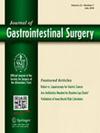Prognostic impact of dysphagia scores in patients with advanced resectable esophageal cancer who underwent radical esophagectomy after preoperative treatment
IF 2.2
3区 医学
Q3 GASTROENTEROLOGY & HEPATOLOGY
引用次数: 0
Abstract
Background
Dysphagia caused by tumor strictures is a major symptom in patients with advanced esophageal cancer. However, the prognostic effect of dysphagia in resectable cases is insufficiently investigated. This study aimed to investigate the prognostic value of dysphagia scores in resectable advanced esophageal cancer who underwent radical esophagectomy after preoperative treatment.
Methods
This retrospective study enrolled 302 consecutive patients with advanced resectable esophageal cancer who received preoperative treatment. The preoperative dysphagia score was used to assess the relationship between tumor stricture and clinical outcomes.
Results
Almost half of the patients had dysphagia scores of 2 to 4 (n = 152 [50.3%]). Lower body mass index, circumferential tumors, and noncurative resection were significantly more common as dysphagia scores worsened. Patients with dysphagia had significantly more advanced ypT stage and worse histopathologic response than those without dysphagia. The 5-year disease-free survival and overall survival (OS) rates for dysphagia scores of 0 to 1, 2 to 3, and 4 were 52.9%, 35.3%, and 26.7% and 60.7%, 40.4%, and 26.7%, respectively. Multivariate analysis identified dysphagia score as an independent factor of OS, similar to surgical curability and ypN stage. The postoperative recurrence rate was significantly higher among patients with dysphagia scores of 2 to 3 (56%) and 4 (67%) than among those with dysphagia scores of 0 to 1 (36%) (P < .001 and P = .037, respectively). Furthermore, distant recurrence in dysphagia scores of 2 to 3 and 4 was higher than in dysphagia scores of 0 to 1 (26%, 46%, and 42%, respectively).
Conclusion
The dysphagia score before initial treatment is associated with postoperative survival in patients with resectable advanced esophageal cancer.
术前治疗后接受根治性食管切除术的晚期可切除食管癌患者吞咽困难评分的预后影响。
背景:肿瘤狭窄导致的吞咽困难是晚期食管癌患者的主要症状。然而,吞咽困难对可切除病例预后的影响尚未得到充分研究。本研究探讨了吞咽困难评分对术前治疗后接受根治性食管切除术的可切除晚期食管癌患者的预后价值:这项回顾性研究连续纳入了302名接受术前治疗的晚期可切除食管癌患者。采用术前吞咽困难评分来评估肿瘤狭窄与临床预后之间的关系:近一半患者的吞咽困难评分为 2-4(152 人,50.3%)。随着吞咽困难评分的恶化,体质指数(BMI)较低、肿瘤呈环状和非根治性切除的患者明显增多。与无吞咽困难的患者相比,有吞咽困难的患者的ypT分期更晚,组织病理学反应更差。吞咽困难评分 0-1、2-3 和 4 的 5 年无病生存率分别为 52.9%、35.3% 和 26.7%,总生存率分别为 60.7%、40.4% 和 26.7%。多变量分析发现,吞咽困难评分是影响总生存率的一个独立因素,与手术治愈率和ypN分期类似。与 0-1 分(36%)的患者相比,吞咽困难评分为 2-3 分(56%)和 4 分(67%)的患者术后复发率明显更高:初次治疗前的吞咽困难评分与可切除晚期食管癌患者的术后生存率有关。
本文章由计算机程序翻译,如有差异,请以英文原文为准。
求助全文
约1分钟内获得全文
求助全文
来源期刊
CiteScore
5.50
自引率
3.10%
发文量
319
审稿时长
2 months
期刊介绍:
The Journal of Gastrointestinal Surgery is a scholarly, peer-reviewed journal that updates the surgeon on the latest developments in gastrointestinal surgery. The journal includes original articles on surgery of the digestive tract; gastrointestinal images; "How I Do It" articles, subject reviews, book reports, editorial columns, the SSAT Presidential Address, articles by a guest orator, symposia, letters, results of conferences and more. This is the official publication of the Society for Surgery of the Alimentary Tract. The journal functions as an outstanding forum for continuing education in surgery and diseases of the gastrointestinal tract.

 求助内容:
求助内容: 应助结果提醒方式:
应助结果提醒方式:


